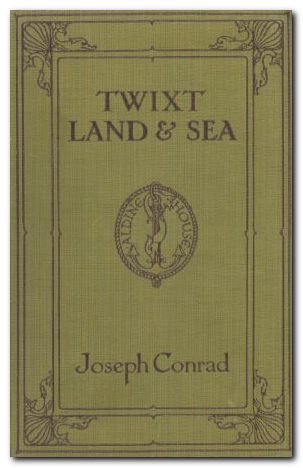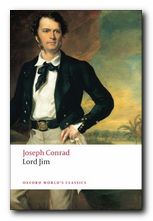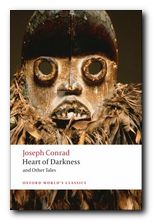how to start analysing prose style
Joseph Conrad was famous for his prose style – yet English was his third language, the first two being Polish and French. He was not unlike the novelist Vladimir Nabokov, who began writing in his native Russian, then switched to French, and finally started writing in English when he emigrated to America in 1940. Both of these authors are widely regarded as great prose stylists and masters of the English language.
Nevertheless, it is not unusual for some readers to complain about the difficulties they feel in grappling with Conrad’s style when encountering his writing for the first time. It’s true that his writing is not the clearest and easiest to understand: in fact a liking for his style is something of an acquired taste. But it is possible to come to terms with the difficulties he presents (the long, complex sentences and abstract language) with concentration, thoughtful reflection, and practice.
The tutorial notes that follow are one way of diffusing these problems by analysing some technical aspects of Conrad’s prose style. They are in no way rigorous or systematic: there are other types of close reading and analysis which can throw light on aspects of a writer’s prose style (see the examples listed below).
The extract which follows is from the opening pages of Conrad’s early story An Outpost of Progress, first published in 1897. It deals with two European characters who have recently arrived at a trading station somewhere in central Africa. If you wish to read the complete story in conjunction with these tutorial notes, it is available free at Project Gutenberg.

First edition – J.M.Dent & Sons 1912
Sample text
The two men watched the steamer round the bend, then, ascending arm in arm the slope of the bank, returned to the station. They had been in this vast and dark country only a very short time, and as yet always in the midst of other white men, under the eye and guidance of their superiors. And now, dull as they were to the subtle influences of surroundings, they felt themselves very much alone, when suddenly left unassisted to face the wilderness; a wilderness rendered more strange, more incomprehensible by the mysterious glimpses of the vigorous life it contained. They were two perfectly insignificant and incapable individuals, whose existence is only rendered possible through the high organization of civilized crowds. Few men realize that their life, the very essence of their character, their capabilities and their audacities, are only the expression of their belief in the safety of their surroundings. The courage, the composure, the confidence; the emotions and principles; every great and every insignificant thought belongs not to the individual but to the crowd: to the crowd that believes blindly in the irresistible force of its institutions and of its morals, in the power of its police and of its opinion. But the contact with pure unmitigated savagery, with primitive nature and primitive man, brings sudden and profound trouble into the heart. To the sentiment of being alone of one’s kind, to the clear perception of the loneliness of one’s thoughts, of one’s sensations—to the negation of the habitual, which is safe, there is added the affirmation of the unusual, which is dangerous; a suggestion of things vague, uncontrollable, and repulsive, whose discomposing intrusion excites the imagination and tries the civilized nerves of the foolish and the wise alike.
Joseph Conrad prose style – analysis
Sentence length
Some of the sentences here are quite long – particularly the last. This is because he is expressing quite complex ideas or generating a very charged atmosphere. But they are not all long: the first, which deals with an action by characters, is much shorter.
Narrative mode
Conrad adopts the common third person omniscient narrative mode. That is, he tells us what his characters do, how they feel, and what they think. But you might notice that statements such as the one begriming ‘Few men realise’ is of a different kind than, say, ‘The two men watched’. Conrad stops telling the story for a moment and is offering us his opinion. In fact everything else up to the end of the paragraph is Conrad’s own general view of the world. He suddenly becomes what is called an ‘intrusive narrator’ at this point. He intervenes in his own narrative to comment on the story and offer his philosophic reflections on life in general.
It’s easy to overlook this distinction when engaged with the drama of the narrative, but it has an important bearing on our interpretation of the story. That’s because these intrusions into the story help him to project a particular view of the world – which add up to an ideology.
Language
You will probably notice that he uses a number of terms which will cause most people to think ‘Now what exactly does he mean by that?’ These are expressions such as ‘irresistible force’, ‘unmitigated savagery’, ‘negation of the habitual’, and ‘discomposing intrusion’. What make these difficult to grasp at first is that he is switching from the very concrete and specific descriptions of the two men and the trading station to an abstract and very general consideration of their moral condition.
This is almost the language of philosophy. The terms ‘force’, ‘savagery’, ‘habitual’, and ‘intrusion’ are all abstract nouns. We are not necessarily conscious of this whilst reading the text, but they take us away from the ‘story’ and force us to consider rather large scale social reflections.
In fact the combination of rather unusual and powerful adjective qualifying an abstract noun – ‘unmitigated savagery, ‘profound trouble’ – is a ‘trade mark’ of Conrad’s prose style. You will see many other examples in almost all his stories and novels.
Prose rhythm
In prose writing, rhythm is easier to feel than to define. You do not need to go into all the technical detail of stress analysis as you might with poetry, but it should be possible to sense that Conrad puts a lot of rhythmic emphasis into what he writes, using a number of literary devices more commonly found in poetry:
- alliteration
- repetition
- balanced clauses
Alliteration
‘The courage, the composure, the confidence’ is a fairly obvious example of alliteration, with an insistent stress falling on the initial letter c in each of these words. Notice too that they are all abstract nouns.
Repetition
The expression ‘with primitive nature and primitive man’ combines both alliteration (in the initial letter p) with repetition of the word ‘primitive’ itself. You might also note that his use of the second ‘primitive’ here throws the emphasis onto the word that follows it – ‘man’. There are plenty of other examples of the same thing in this paragraph: ‘more strange, more incomprehensible’ and ‘every great and every insignificant’ are just two.
Repetition is just one of the rhetorical devices at work here: and rhetoric is ‘the art of speakers or writers to persuade, inform, or motivate their audience’.
Balanced clauses
The rather long sentences in this passage also contain a different kind of repetition – that is, clauses which are similar to each other in grammatical construction. These are sometimes called ‘balanced clauses’. The final sentence begins with the phrase ‘To the sentiment of being alone’, and in order to ‘tug’ us through the fairly lengthy reflection that follows Conrad repeats the initial ‘to’ and the construction of the clause of which it is a part. So we have, ‘To the sentiment of being … to the clear perception … to the negation of the habitual’.
Finally, look at the construction of the sentence that begins ‘Few men realise that their life’. Conrad wants to explain what he has in mind by using the term ‘life’, so he inserts two clauses which expand the notion. But in doing so, and whilst we are so to speak ‘waiting’ for the end of the sentence, his terms of expansion are nicely balanced: ‘the very essence of their character’ (with its emphasis falling on ‘essence’ and ‘character’, is paralleled by the following clause ‘their capabilities and their audacities’ with the emphasis falling again on two abstract nouns.
The abstraction forces readers into a quasi-philosophical mode of thinking about ‘life’. What exactly does he mean by people’s ‘capabilities’ and ‘audacities’? His answers will come from the events of the narrative itself – which show his two characters to be lazy, stupid, and moral cowards. This appears to ‘prove’ or at least justify his judgements about human beings and society in general – which is part of any writer’s conscious or unconscious objective.
 Studying Fiction is an introduction to the basic concepts and the language you will need for studying prose fiction. It explains the elements of literary analysis one at a time, then shows you how to apply them. The guidance is carefully graded, starting from simple issues of language then progressing to more complex issues. The single volume contains stories by Arthur Conan Doyle, Katherine Mansfield, Thomas Hardy, Joseph Conrad, D.H. Lawrence, and Charles Dickens. All of them are excellent tales in their own right. The guidance notes on this page were written by the same author.
Studying Fiction is an introduction to the basic concepts and the language you will need for studying prose fiction. It explains the elements of literary analysis one at a time, then shows you how to apply them. The guidance is carefully graded, starting from simple issues of language then progressing to more complex issues. The single volume contains stories by Arthur Conan Doyle, Katherine Mansfield, Thomas Hardy, Joseph Conrad, D.H. Lawrence, and Charles Dickens. All of them are excellent tales in their own right. The guidance notes on this page were written by the same author.
![]() Buy the book from Amazon UK
Buy the book from Amazon UK
![]() Buy the book from Amazon US
Buy the book from Amazon US
Close reading exercises
![]() Sample close reading of Charles Dickens’ Bleak House
Sample close reading of Charles Dickens’ Bleak House
![]() Sample close reading of Katherine Mansfield’s The Voyage
Sample close reading of Katherine Mansfield’s The Voyage
![]() Sample close reading of Virginia Woolf’s Monday or Tuesday
Sample close reading of Virginia Woolf’s Monday or Tuesday
Other novels by Joseph Conrad
 Lord Jim (1900) is the earliest of Conrad’s big and serious novels, and it explores one of his favourite subjects – cowardice and moral redemption. Jim is a ship’s captain who in youthful ignorance commits the worst offence – abandoning his ship. He spends the remainder of his adult life in shameful obscurity in the South Seas, trying to re-build his confidence and his character. What makes the novel fascinating is not only the tragic but redemptive outcome, but the manner in which it is told. The narrator Marlowe recounts the events in a time scheme which shifts between past and present in an amazingly complex manner. This is one of the features which makes Conrad (born in the nineteenth century) considered one of the fathers of twentieth century modernism.
Lord Jim (1900) is the earliest of Conrad’s big and serious novels, and it explores one of his favourite subjects – cowardice and moral redemption. Jim is a ship’s captain who in youthful ignorance commits the worst offence – abandoning his ship. He spends the remainder of his adult life in shameful obscurity in the South Seas, trying to re-build his confidence and his character. What makes the novel fascinating is not only the tragic but redemptive outcome, but the manner in which it is told. The narrator Marlowe recounts the events in a time scheme which shifts between past and present in an amazingly complex manner. This is one of the features which makes Conrad (born in the nineteenth century) considered one of the fathers of twentieth century modernism.
![]() Buy the book from Amazon UK
Buy the book from Amazon UK
![]() Buy the book from Amazon US
Buy the book from Amazon US
 Heart of Darkness (1902) is a tightly controlled novella which has assumed classic status as an account of the process of Imperialism. It documents the search for a mysterious Kurtz, who has ‘gone too far’ in his exploitation of Africans in the ivory trade. The reader is plunged deeper and deeper into the ‘horrors’ of what happened when Europeans invaded the continent. This might well go down in literary history as Conrad’s finest and most insightful achievement, and it is based on his own experiences as a sea captain. This volume also contains ‘An Outpost of Progress’ – the magnificent study in shabby cowardice which prefigures ‘Heart of Darkness’.
Heart of Darkness (1902) is a tightly controlled novella which has assumed classic status as an account of the process of Imperialism. It documents the search for a mysterious Kurtz, who has ‘gone too far’ in his exploitation of Africans in the ivory trade. The reader is plunged deeper and deeper into the ‘horrors’ of what happened when Europeans invaded the continent. This might well go down in literary history as Conrad’s finest and most insightful achievement, and it is based on his own experiences as a sea captain. This volume also contains ‘An Outpost of Progress’ – the magnificent study in shabby cowardice which prefigures ‘Heart of Darkness’.
![]() Buy the book from Amazon UK
Buy the book from Amazon UK
![]() Buy the book from Amazon US
Buy the book from Amazon US
© Roy Johnson 2014
Joseph Conrad links
Joseph Conrad at Mantex
Biography, tutorials, book reviews, study guides, videos, web links.
Joseph Conrad – his greatest novels and novellas
Brief notes introducing his major works in recommended editions.
Joseph Conrad at Project Gutenberg
A major collection of free eTexts in a variety of formats.
Joseph Conrad at Wikipedia
Biography, major works, literary career, style, politics, and further reading.
Joseph Conrad at the Internet Movie Database
Adaptations for the cinema and television – in various languages. Full details of directors and actors, production notes, box office, trivia, and quizzes.
Works by Joseph Conrad
Large online database of free HTML texts, digital scans, and eText versions of novels, stories, and occasional writings.
The Joseph Conrad Society (UK)
Conradian journal, reviews. and scholarly resources.
The Joseph Conrad Society of America
American-based – recent publications, journal, awards, conferences.
Hyper-Concordance of Conrad’s works
Locate a word or phrase – in the context of the novel or story.
More on Joseph Conrad
Twentieth century literature
More on Joseph Conrad tales